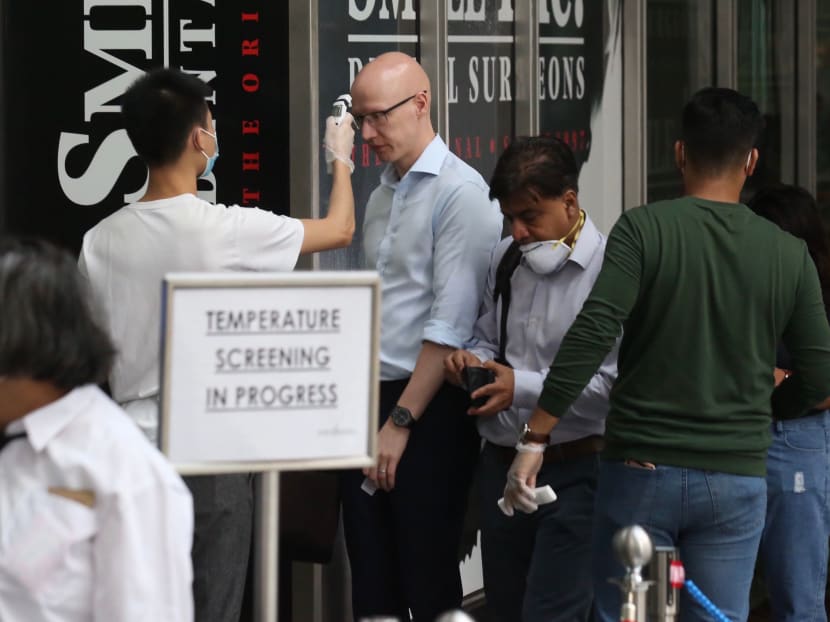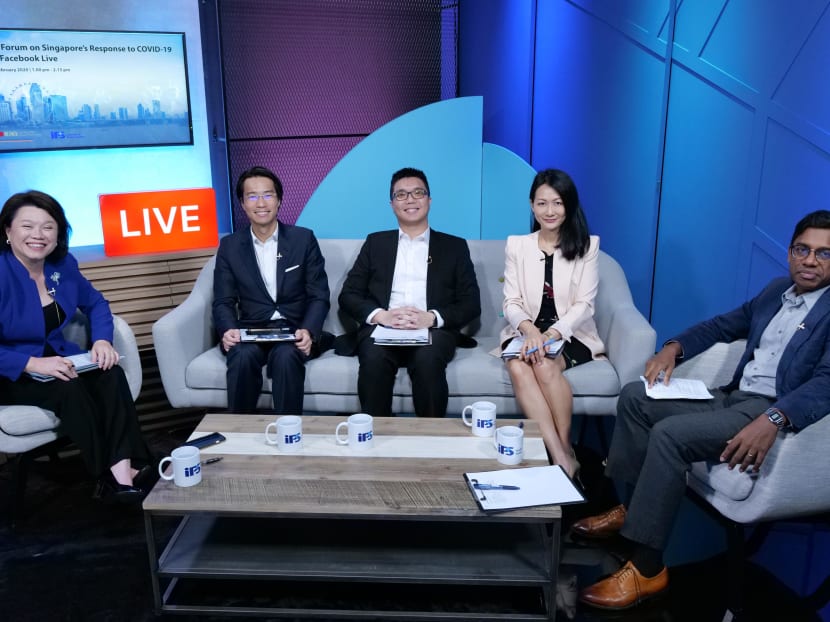It’s ‘battle against nature’ for Covid-19 and more time is needed to learn about disease: MOH official
SINGAPORE — The Covid-19 disease appears to be “containable” based on the measures that some countries, including Singapore, have taken to combat the coronavirus outbreak, even though much is still unknown about it, said the director of communicable diseases at the Ministry of Health (MOH).

People getting their temperature checked before entering their office building. An official from the Ministry of Health said that the Covid-19 coronavirus has affected a large number of people across the globe and caused many deaths, so its impact cannot be trivialised.
SINGAPORE — The Covid-19 disease appears to be “containable” based on the measures that some countries, including Singapore, have taken to combat the coronavirus outbreak, even though much is still unknown about it, said the director of communicable diseases at the Ministry of Health (MOH).
“China, Hong Kong, Singapore have (put in place) quite a few different measures and different styles of containment, and they seem to be reducing the number of new cases.
“So perhaps it is not quite as transmissible as influenza,” Dr Vernon Lee said on Tuesday (Feb 25) at a panel discussing how Singapore has responded to the Covid-19 outbreak so far.
However, he stressed repeatedly that more time is needed to understand the transmission and the severity characteristics of Covid-19.
“Time will tell. I think we still need to learn more about this disease.”
Dr Lee, who is also an adjunct associate professor at the Saw Swee Hock School of Public Health, was one of four panellists at the discussion organised by the Institute of Policy Studies (IPS) and streamed live on its Facebook page.
The others were economist Barnabas Gan from the United Overseas Bank (UOB); Dr Carol Soon, senior research fellow at IPS; and Dr Shashi Jayakumar, senior fellow at the S Rajaratnam School of International Studies (RSIS).
They delved into how Singapore has dealt with the medical, economic, and social impact of the public health emergency.
Dr Lee was asked by Dr Gillian Koh, moderator and deputy director of research at IPS, to give his take on how medical science and epidemiologists around the world are dealing with the new coronavirus, which had its first outbreak in Wuhan of China’s Hubei province in December last year.
In response, he said it is unprecedented the way in which the amount of information known about Covid-19 has ballooned in the past two months, but there are still several unknowns.
“It is a battle against nature, and with time, some of these answers will be clearer.”
When it came to establishing the mortality rate of the disease, for example, it is challenging to detect milder cases of Covid-19, which may also skew the statistics on case fatality rates by several magnitudes, he said.
In Singapore, more than 10 per cent of Covid-19 cases have been admitted to the intensive care unit, which “is certainly concerning”, Dr Lee said.
“Because of the sheer number of people that are affected across the globe, (Covid-19) still caused many deaths. So we do not want to trivialise any virus because it has some potential impact.”

TOURISM LOSS COULD WIPE OUT 2020 ECONOMIC GAINS
Since the time needed to fully learn about Covid-19 may be protracted, the economic impact of this disease can be significant, considering that Singapore’s economy was affected only across a single quarter during the severe acute respiratory syndrome (Sars) pandemic in 2003, Mr Gan said.
Before the outbreak arrived in Singapore, UOB predicted that Singapore’s economy would grow by 1.5 per cent this year.
However, current economic figures now point to a 25 to 30 per cent fall in tourism arrivals, which could work out to a S$6.8 billion to S$8.1 billion fall in tourism receipts this year due to the viral outbreak, he said. This is equivalent to the 1.5 per cent growth that UOB predicted earlier for 2020.
“That will completely wipe out our GDP (gross domestic product) and bring it to around 0.5 per cent, just based on how much our tourism receipts actually fall,” he said.
Dr Koh noted that the fall could be greater, given the impact on other non-tourism sectors such as aviation, manufacturing, retail, and food-and-beverage. She asked Mr Gan whether the measures announced during Budget 2020 were enough to bolster Singapore through this period.
In his Budget speech last week, Deputy Prime Minister and Finance Minister Heng Swee Keat had announced that the Government will set aside a total of S$6.4 billion to help workers, firms, households and frontline agencies tackle Covid-19.
Mr Gan said some people have noted that a few measures came with a short time span, such as the three-month period for the Jobs Support Scheme to help companies retain workers, but the Government has around S$8 billion more up its sleeve in accumulated surpluses during the current term of government. This kitty could be used to “push up” the economy if needed, he said.
SINGAPOREANS HAVE TO FACE A ‘SLOW-BURN’ CRISIS
On how the people here have reacted, Dr Soon and Dr Jayakumar said that Singaporeans need to be able to prepare emotionally for health pandemics, which Dr Jayakumar described as a “slow-burn” crisis.
Dr Soon noted that three types of misinformation emerged during this outbreak. These are factual misinformation, such as the false rumours of MRT station closures; misleading advisories such as unproven home remedies being shared online; and xenophobic, racist sentiments that have no basis in fact, which are observed both overseas and in Singapore.
She said that Singapore has been effective in trying to plug information gaps about the virus through “a very interesting and relatively efficacious playbook”.
Besides daily updates about the spread of the virus, the Government reinforces key messages through different channels, such as through various government ministries, the media, and experts to help people dissect the situation.
It has also wielded the Protection from Online Falsehoods and Manipulation Act (Pofma) to counter Covid-19 falsehoods in a way that most people agree with, she said.
Government spokespersons were also quick to counter rumours, she added, noting how Health Minister Gan Kim Yong had come out at one point to categorically refute talk that the authorities were going to raise the Disease Outbreak Response System Condition from Orange level to Red.
Still, more can be done, she said. While the Government has been providing updates usually at a certain time each day, on some days, the information may arrive later in the evening. This may create suspicions, Dr Soon said.
“Where there is an information gap, people will rely on heuristics — mental shortcuts — to plug the gaps,” she added.
Dr Jayakumar said that while Singapore is prepared for one-off incidents such as terrorist attacks, the Government, academics and think-tanks should do more to look at how the country can bounce back from slow-burn crises such as pandemics and climate change.
“In my point of view, it is almost problematic that Singapore is so safe, clean and secure. It is not normal... it is supernormal, because almost nothing of note, security-wise, seems to happen in Singapore.
“Now we have to accept that these things may be there for a long time,” Dr Jayakumar said.








